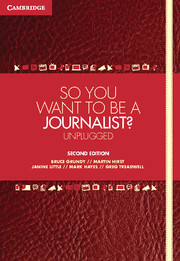Book contents
- Frontmatter
- Contents
- About the authors
- Preface to the second edition
- Acknowledgements
- Acknowledgements for the second edition
- Introduction Journalism unplugged
- Part 1 DISCOVERING JOURNALISM
- Part 2 FINDING AND UNDERSTANDING NEWS
- Part 3 NEWS-WRITING ACROSS THE GENRES
- Part 4 Legal and ethical issues
- 10 Journalism and the law
- 11 Dealing with defamation – everyone has the right to reputation
- 12 Some thoughts about ethics today
- 13 Regulating journalism
- 14 The meaning of professional in journalism
- References
- Index
11 - Dealing with defamation – everyone has the right to reputation
from Part 4 - Legal and ethical issues
Published online by Cambridge University Press: 05 October 2012
- Frontmatter
- Contents
- About the authors
- Preface to the second edition
- Acknowledgements
- Acknowledgements for the second edition
- Introduction Journalism unplugged
- Part 1 DISCOVERING JOURNALISM
- Part 2 FINDING AND UNDERSTANDING NEWS
- Part 3 NEWS-WRITING ACROSS THE GENRES
- Part 4 Legal and ethical issues
- 10 Journalism and the law
- 11 Dealing with defamation – everyone has the right to reputation
- 12 Some thoughts about ethics today
- 13 Regulating journalism
- 14 The meaning of professional in journalism
- References
- Index
Summary
Chapter objectives
After reading this chapter, you should be confident about the following:
You know what defamation is – and understand the law
You can recognise defamatory statements and know why they are injurious to reputation
You know how to check to see if a defence makes publication possible
You know when you are protected by privilege and to what extent
Every journalist needs to understand the issues around defamation. The purpose must be to ‘get away with’ as much as possible – to use the law and the defences to defamation as a tool to publish, not as a brake on the flow of information that is in the public interest. This chapter is not a substitute for detailed study of the laws of defamation; it is a guide to keeping you (and your publication) out of trouble.
Reputation damage: A costly legal business
My initial response was to sue her for defamation of character, but then I realized that I had no character.
Charles BarkleyThe basketball player Charles Barkley could dunk the ball and dribble; he also has a good sense of humour. Defamation laws protect people’s reputation – their good name (assuming they have one, of course). Wrongly harming or damaging a person’s reputation can be a serious problem too. What all this means is that while it may be possible to publish all kinds of material before the ‘course of justice’ has commenced or after it has concluded, and not be found to be in contempt, what you publish could still be defamatory. And someone may sue you. So even when there is no ‘course of justice’ running, you still need to be careful about the things you publish.
- Type
- Chapter
- Information
- So You Want To Be A Journalist?Unplugged, pp. 230 - 244Publisher: Cambridge University PressPrint publication year: 2012



